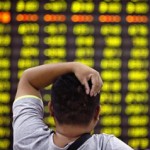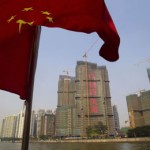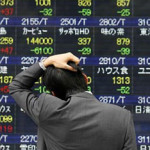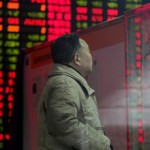Greece is bad but this is worse. The Chinese stock market
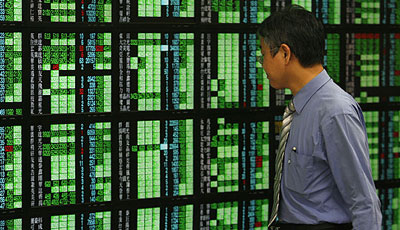
The twin fears of China and Greece will hang over markets Thursday with China increasingly the bigger concern.
“There’s definitely an issue if we see a further correction in the Chinese stock market,” said Russ Koesterich, BlackRock’s chief investment strategist.
Stocks were smacked hard Wednesday by concerns that China’s economy will begin to feel the pain of a selloff that has erased more than 32 percent from Shanghai stocks. The meltdown in Shanghai and Shenzen bled into the more established Hong Kong market Wednesday, raising fears foreign investors were starting to head for the exits.
“It may take more than a few weeks to squeeze some of the excesses out of that market. I think the U.S. can advance even if China is experiencing a selloff,” Koesterich said, adding Wall Street needs to get past Greece and focus on the positives in quarterly earnings.
“Greece is going to be a negative in the short term. If you don’t see a deal on Sunday, you’re going to see a negative knee-jerk reaction on Monday. I don’t think a ‘Grexit’ is priced in,” he said. However, he does not see Greece as a major problem for the market longer term, since Europe is backstopped by the European Central Bank.
For Thursday’s markets, there are weekly jobless claims at 8:30 a.m. EDT and a $13 billion 30-year bond auction at 1 p.m. Earnings are expected from PepsiCo and Walgreens Boots Alliance.
There are several Fed speakers though traders are waiting for speech from Chair Janet Yellen on Friday. Thursday’s speakers include Fed Gov. Lael Brainard, speaking at 10:15 a.m. ET on regulatory reform; Minneapolis Fed President Narayana Kocherlakota at 5:45 a.m. on fiscal policy; Kansas City Fed President Esther George at 12:30 p.m. on the economic outlook and monetary policy; and Chicago Fed President Charles Evans at 9:30 a.m.
“The silver lining to this is you could get a more dovish Fed than you would have otherwise,” Koesterich said. The U.S. central bank, in the minutes of its June meeting, noted the concerns about Greece and China’s growth, and traders have been betting it will slow its march toward raising rates because of the financial turbulence.
Investors are clearly more focused on China. “It’s influencing behavior. There’s not a big fundamental link between the Chinese stock market and the U.S. economy though clearly this is affecting sentiment, and it’s not helping us with the context of what’s going on in Greece and what appears to be a final, final deadline that comes up on Sunday,” said Koesterich.
The Dow on Wednesday was down 261 at 17,515, and the S&P 500 was off 34 at 2,046, but European stocks closed higher as Greece delivered reform proposals to creditors.
U.S. stocks were also trading against the backdrop of technical problems at the New York Stock Exchange that shut down floor trading at the exchange from about 11:30 a.m. ET, for more than three hours into the final hour of trading. And like traders tend to do, they floated conspiracy theories that somehow outages at United Airlines and The Wall Street Journal were all related, but U.S. officials said they did not see any immediate connection.
Traders also said the volume on trading desks was lighter, but they were able to trade NYSE stocks on Nasdaq and other electronic trading venues. Still, they will be watching to see if the floor opens normally Thursday.
“It’s the last floor in the U.S. in equities so it is important. That’s what they sort of hang their hat on. What makes them different is because they have the floor traders. This is going to make it more difficult to say the floor traders are important when there’s a technical problem. Because the technical problems take out the floor traders too,” said Sandler O’Neill analyst Richard Repetto.
China’s stock market also operated with a halt but that was intentional and affected hundreds of names on the mainland exchange, as the government attempted to stabilize the market. The many steps taken by regulators include halting IPOs, reducing fees on trading, encouraging pensions to buy stocks, cracking down on shorts and providing liquidity to margin lenders. China has also been cutting interest rates.
“There are broader issues the Chinese authorities have to deal with which involve managing the deceleration of the economy,” Koesterich said. “Clearly, the bursting of the stock market bubble is clearly not helping.”
U.S. strategists have been highly critical of China’s many efforts to tamper with the market to end the selloff, but Peter Donisanu, global research strategist at Wells Fargo Investment Institute, said China just has to make the right moves and make them fast.
“I think the best approach at this point in time is just to shut the markets for a week. It’s not unprecedented. We saw the Greek government do it,” he said.
Based on the timing for Greece, “If we don’t see something by the end of the week, I’m not sure what Monday will look like,” he said.
Donisanu said one problem is that while regulators have taken action, the central government has been silent. He said a month ago the central government was telling people the stock market was a good place to save.
“All these half measure steps since the middle of June have not instilled any confidence in the retail investor. Eighty percent of that market is driven by retail investors, and that’s who you have to convince,” Donisanu said. The government needs to introduce a comprehensive package, not just incremental measures, he said.
Strategists have said the regulators moves appear so far to counter the market reform China has tried to pursue.
Last month, MSCI said Chinese A-shares, those traded on the volatile Shanghai exchange, could become part of its emerging markets index if the Chinese government met conditions. That would open China’s local market to many more international funds and investors.
“One of the reasons why MSCI did not add China’s A-shares to its listing this year was because of some of the transparency issues and that was the data provided by the central government that was economic data. There’s still loopholes in how public firms report their financials. I think the way the government is responding now is by keeping quiet,” Donisanu said. “That could be interpreted as a lack of credibility.”
Koesterich said as of now, the Chinese market’s are still separated from other global equities markets, and at some point they could become a buying opportunity. But that time is not now.
“If this hits the Chinese consumer, and the broader Chinese economy, you’re going to see a broader slowdown, and you’re going to see that in the manufacturing sector,” said Koesterich.
Source: CNBC – Greece is bad but this is worse









